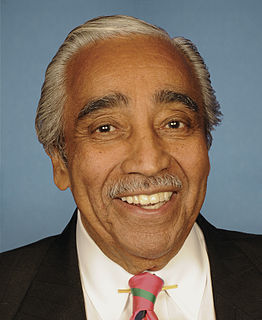A Quote by Charles Tilly
Going to war accelerated the move from indirect to direct rule. Almost any state that makes war finds that it cannot pay for the effort from its accumulated reserves and current revenues. Almost all war-making states borrow extensively, raise taxes, and seize the means of combat - including men - from reluctant citizens who have other uses for their resources.
Related Quotes
after a generation or two of shedding the deliberate political encumbrances to war ... of dropping Congress from the equation altogether, of super-empowering the presidency with total war-making power and with secret new war-making resources that answer to no one but him, of insulating the public from not only the cost of war but sometimes even the knowledge that it's happened - war making has become almost an autonomous function of the American state. It never stops.
In every major war we have fought in the 19th and 20th centuries. Americans have been asked to pay higher taxes - and nonessential programs have been cut - to support the military effort. Yet during this Iraq war, taxes have been lowered and domestic spending has climbed. In contrast to World War I, World War II, the Korean War and Vietnam, for most Americans this conflict has entailed no economic sacrifice. The only people really sacrificing for this war are the troops and their families.
To have security against atomic bombs and against the other biological weapons, we have to prevent war, for if we cannot prevent war every nation will use every means that is at their disposal; and in spite of all promises they make, they will do it. At the same time, so long as war is not prevented, all the governments of the nations have to prepare for war, and if you have to prepare for war, then you are in a state where you cannot abolish war.
The use of our military in combat should first require declaration of war. I have long called for reinstating the military draft, simply because I believe strongly that a national decision to go to war must also include a broad commitment to share its burdens. Whenever Congress decides to fund a war or other U.S. combat activities, it must provide a means to pay for it-then and there-not later. If we don't have the will to fully share the burdens of war, then we have no right to send our sons and daughters into harm's way.
Is it not tragic, for example, that while in the last World War almost everyone believed it was the war to end all wars and wanted to make it so, now in this Second World War almost no writer that I have read dares even suggest that this is the war to end all wars, or act on that belief? We have lost the courage to hope.
What's important to remember politically about this, is if you’re a state and you don’t set up an Exchange, that means your citizens don’t get their tax credits. But your citizens still pay the taxes that support this bill. So you’re essentially saying to your citizens, you’re going to pay all the taxes to help all the other states in the country. I hope that’s a blatant enough political reality that states will get their act together and realize there are billions of dollars at stake here in setting up these Exchanges, and that they’ll do it. But you know, once again, the politics can get ugly around this.
Particularly when the war power is invoked to do things to the liberties of people, or to their property or economy that only indirectly affect conduct of the war and do not relate to the engagement of the war itself, the constitutional basis should be scrutinized with care. ... I would not be willing to hold that war powers may be indefinitely prolonged merely by keeping legally alive a state of war that had in fact ended. I cannot accept the argument that war powers last as long as the effects and consequences of war for if so they are permanent -- as permanent as the war debts.
We are in a war of a peculiar nature. It is not with an ordinary community, which is hostile or friendly as passion or as interest may veer about: not with a state which makes war through wantonness, and abandons it through lassitude. We are at war with a system, which by its essence, is inimical to all other governments, and which makes peace or war, as peace and war may best contribute to their subversion. It is with an armed doctrine that we are at war. It has, by its essence, a faction of opinion, and of interest, and of enthusiasm, in every country.
I regard the state of which I am a citizen as a public utility, like the organization that supplies me with water, gas, and electricity. I feel that it is my civic duty to pay my taxes as well as my other bills, and that it is my moral duty to make an honest declaration of my income to the income tax authorities. But I do not feel that I and my fellow citizens have a religious duty to sacrifice our lives in war on behalf of our own state, and, a fortiori, I do not feel that we have an obligation or a right to kill and maim citizens of other states or to devastate their land.




































